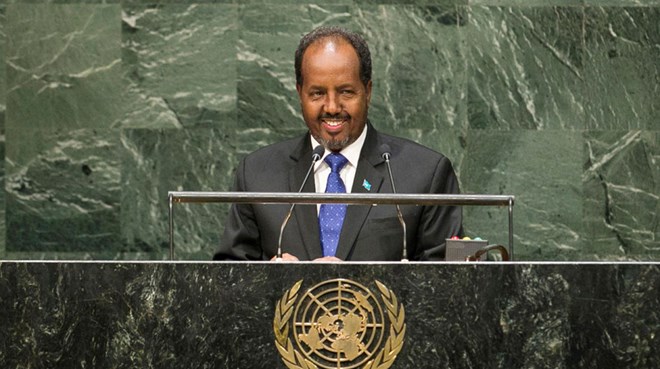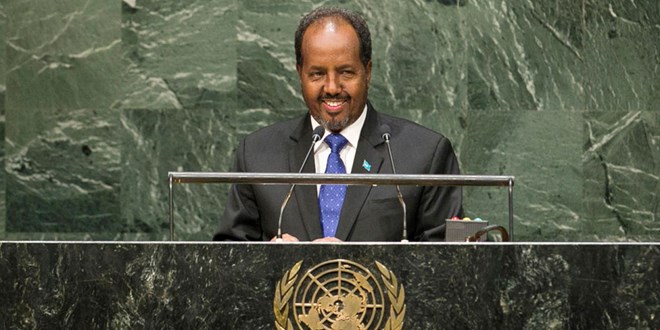[ad_1]
By Mohamed Omar Hashi
Sunday, December 10, 2023

President Hasan Sheikh has proven to be a transformative leader, guiding Somalia through a pivotal period marked by instability and insecurity. His notable accomplishment lies in the successful advocacy for the removal of the arms embargo that had been imposed on Somalia since 1992. Against the backdrop of a tumultuous history marred by civil strife and the ascent of extremist factions, President Hasan Sheikh’s administration has exhibited a steadfast dedication to reconstructing the nation’s armed forces and staunchly confronting the spectre of terrorism. In this comprehensive exploration, we will scrutinise the historical context of the arms embargo, the obstacles faced by preceding administrations, and the groundbreaking strides achieved by President Hasan Sheikh in persuading the United Nations to rescind the longstanding restrictions, paving the way for a new era of stability in Somalia.
THE COMPLEX EVOLUTION OF THE ARMS EMBARGO ON SOMALIA
The roots of the arms embargo lie in the early ’90s when Somalia was plunged into a state of turmoil marked by civil unrest and conflict. In response to the worsening situation, the Security Council, in January 1992, imposed an arms embargo on the country. The embargo targeted both the Somali government and non-state actors, reflecting the international community’s concerns about the proliferation of weapons exacerbating the conflict and hampering humanitarian efforts.
Originally imposed as a response to the country’s political instability and civil conflict, over time, however, the situation in Somalia has evolved, with the government gradually gaining strength and international support. This has led to debates about the necessity and effectiveness of the embargo, as Somalia argued that lifting the embargo would empower the government to better address security challenges.
Failures of previous Administrations
In the face of the arms embargo, successive administrations in Somalia grappled with severe limitations in their efforts to persuade the United Nations of their ability to maintain a formidable military force. The embargo’s imposition cast a shadow over Somalia’s political landscape, restricting the nation’s leaders from showcasing their competence in ensuring the responsible handling of weaponry. The absence of substantial political sway and a heavyweight status further compounded the challenge, hindering these administrations from providing credible assurances to the global community that arms would not be diverted to non-state entities. This failure to instil confidence in their capacity to manage military resources effectively became a formidable obstacle, impeding Somalia’s journey towards attaining a stable and secure future.
As the weight of the arms embargo persisted, Somalia faced a dual struggle — not only were its leaders hampered in building a robust defence capability, but the international community also remained sceptical about the nation’s ability to prevent the proliferation of weapons to unauthorised entities. The erosion of trust on the global stage thwarted Somalia’s advancements towards stability, as the country found itself caught in a cycle where the embargo not only restricted its military development but also hindered diplomatic efforts to rebuild its reputation. Overcoming these challenges became imperative for Somalia to break free from the shackles of insecurity and forge a path towards a more promising and stable future on the international stage.
SECURITY SHIFT: SOMALIA’S ARMS EMBARGO COMES TO AN END
Current Administration’s Achievements
In a momentous stride towards sovereignty and security, President Hasan Sheikh’s administration has successfully navigated the diplomatic landscape to bring about the end of the arms embargo on Somalia. This triumph is not just a symbolic gesture but a strategic move that underscores Somalia’s commitment to responsible governance security, and the well-being of its citizens.
The United Nations Security Council unanimously voted Friday, the 1st of December 2023, in favour to lift the remaining restrictions on Somalia’s access to weapons. President Hasan Sheikh’s adept handling of international relations has paved the way for Somalia to regain full control over its armament decisions after three decades of constraints. This achievement is a testament to the president’s dedication to steering Somalia towards a path of autonomy and self-determination.
President Hasan Sheikh’s warm embrace of the U.N. resolution emphasises the historic importance of this moment. It marks a turning point in Somalia’s journey, highlighting the nation’s maturity in handling its security affairs responsibly. The president’s assurance to the international community regarding the implementation of a stringent oversight system demonstrates Somalia’s commitment to managing the influx of arms with prudence and care.
Strategic long-term vision
The lifting of the arms embargo marks a significant turning point in Somalia’s efforts to strengthen its national security apparatus. President Hasan Sheikh’s acknowledgment of the modernised Somali Defence Force as a linchpin in addressing various security threats demonstrates a forward-thinking approach to the country’s safety. Somalia grapples with a complex array of challenges, from the persistent threat of terrorism to the menace of maritime piracy, the illicit trade of narcotics, the potential spread of pandemic diseases, and the imperative need for effective disaster relief. By investing in a well-equipped military, President Sheikh is not only safeguarding the nation’s immediate interests but also laying the foundation for a more secure and resilient Somalia in the face of evolving security dynamics.
The decision to end the arms embargo underscores the government’s commitment to tackling the root causes of insecurity and instability in Somalia. A strengthened and modernised Somali Defence Force will not only serve as a deterrent to external threats but will also enhance the country’s capacity to address internal challenges. President Hasan Sheikh’s strategic vision recognizes that an effective military is essential not
only for responding to immediate security concerns but also for fostering long-term stability and development. The move reflects a commitment to creating an environment where citizens can thrive, free from the constant spectre of violence and uncertainty.
CONCLUDING REMARKS
In conclusion, as we witness the end of the arms embargo, we applaud President Hasan Sheikh’s transformative leadership. His strategic approach has not only led to a significant diplomatic victory but also positions Somalia on a trajectory towards a more stable and secure future. The president’s tenure stands as a beacon of progress and hope for the nation, showcasing the resilience and determination of the Somali people under his guidance. The end of the arms embargo is not just a triumph for President Hasan Sheikh; it is a triumph for Somalia and its people. It marks a new chapter in the nation’s history, characterised by responsible governance, strategic diplomacy, and a commitment to a secure and prosperous future.
Mohamed Omar Hashi was a Member of the Transitional Federal Parliament of Somalia, and holds an M.A. in International Security Studies from the University Of Leicester.
E-mail: [email protected]
Twitter: @mohamedohashi
[ad_2]
